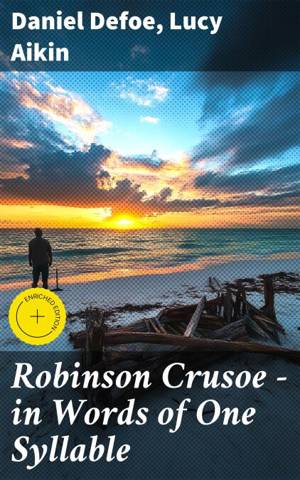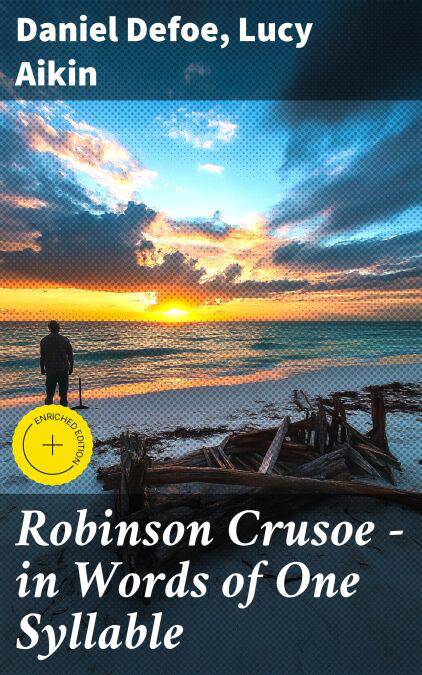
- Afhalen na 1 uur in een winkel met voorraad
- Gratis thuislevering in België vanaf € 30
- Ruim aanbod met 7 miljoen producten
- Afhalen na 1 uur in een winkel met voorraad
- Gratis thuislevering in België vanaf € 30
- Ruim aanbod met 7 miljoen producten
Zoeken
Robinson Crusoe — in Words of One Syllable E-BOOK
Enriched edition. A Unique Rendition of a Classic Adventure Tale in Simplified Language
Daniel Defoe, Lucy Aikin
E-book | Engels
€ 1,99
+ 1 punten
Omschrijving
In 'Robinson Crusoe '— in Words of One Syllable,' readers are invited to explore Daniel Defoe's timeless adventure through the lens of Lucy Aikin's linguistic adaptation. This anthology takes a fresh approach to literary accessibility, maintaining the richness of classic literature while simplifying its language. The collection not only preserves the essence and adventure of the original 'Robinson Crusoe' but also highlights the enduring relevance of its themes '— isolation, survival, and human resilience '— in an ingeniously stripped-down format that invites readers of all ages and reading proficiencies to engage with Defoe's narrative. This unique version owes its existence to the collaborative spirit encapsulated by Defoe's original narrative genius and Aikin's skillful adaptation. While Defoe's role in establishing the novel as a literary form is unquestioned, Aikin's contributions articulate the inclusivity movement in literature. Emerging from a literary lineage and steeped in the ideals of accessible education, her work resonates with the democratization of literature and the spread of Enlightenment ideals. Through this collection, readers gain insights into how historical constraints and innovations have shaped a text poised between classic literary tradition and educational reform. This collection stands as a testament to the profound versatility of storytelling. Perfect for educators, families, and literary enthusiasts, it serves as both a teaching tool and a restorative read. By delving into this work, readers are afforded the chance to experience a classic narrative through varied linguistic expressions, fostering an appreciation for narrative form and linguistic adaptation. The book enriches its audience with an understanding of literature's capacity to transcend boundaries of time, language, and literacy.
In this enriched edition, we have carefully created added value for your reading experience:
- A succinct Introduction situates the work's timeless appeal and themes.
- The Synopsis outlines the central plot, highlighting key developments without spoiling critical twists.
- A detailed Historical Context immerses you in the era's events and influences that shaped the writing.
- A thorough Analysis dissects symbols, motifs, and character arcs to unearth underlying meanings.
- Reflection questions prompt you to engage personally with the work's messages, connecting them to modern life.
- Hand‐picked Memorable Quotes shine a spotlight on moments of literary brilliance.
- Interactive footnotes clarify unusual references, historical allusions, and archaic phrases for an effortless, more informed read.
In this enriched edition, we have carefully created added value for your reading experience:
- A succinct Introduction situates the work's timeless appeal and themes.
- The Synopsis outlines the central plot, highlighting key developments without spoiling critical twists.
- A detailed Historical Context immerses you in the era's events and influences that shaped the writing.
- A thorough Analysis dissects symbols, motifs, and character arcs to unearth underlying meanings.
- Reflection questions prompt you to engage personally with the work's messages, connecting them to modern life.
- Hand‐picked Memorable Quotes shine a spotlight on moments of literary brilliance.
- Interactive footnotes clarify unusual references, historical allusions, and archaic phrases for an effortless, more informed read.
Specificaties
Betrokkenen
- Auteur(s):
- Uitgeverij:
Inhoud
- Aantal bladzijden:
- 138
- Taal:
- Engels
Eigenschappen
- Productcode (EAN):
- 4057664632166
- Verschijningsdatum:
- 21/11/2019
- Uitvoering:
- E-book
- Beveiligd met:
- Digital watermarking
- Formaat:
- ePub

Alleen bij Standaard Boekhandel
+ 1 punten op je klantenkaart van Standaard Boekhandel
Beoordelingen
We publiceren alleen reviews die voldoen aan de voorwaarden voor reviews. Bekijk onze voorwaarden voor reviews.







